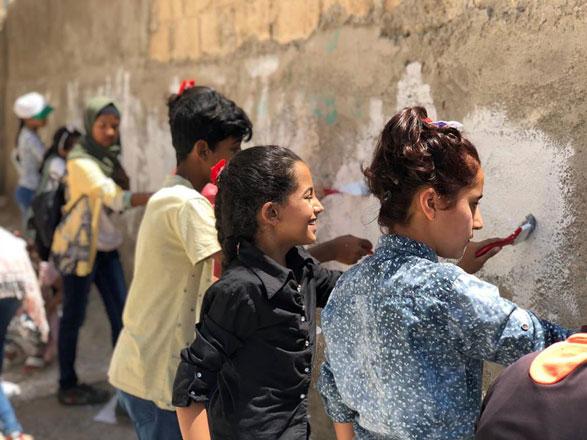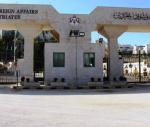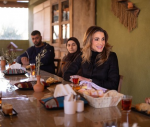You are here
‘ILearn’ initiative helps families in need go digital
By Bahaa Al Deen Al Nawas - Apr 30,2020 - Last updated at May 01,2020
AMMAN — Since the suspension of schools in mid-March at the beginning of the lockdown in Jordan, the government turned towards remote education, with many families facing technological problems pertaining to the availability of gadgets and Internet to keep up with their children’s studies.
Therefore, “ILearn”, an initiative founded in 2012, launched on Thursday the “My Education” campaign in order to distribute gadgets; mainly laptops and tablets, to help families provide all their children with the education they need.
“At ILearn, we work with children at risk, and when the coronavirus crisis began, we started turning our offline programmes into online ones, which is how we noticed that many families were unable to access those and this is how we learned about their inability to digitally engage with us,” Saddam Sayyaleh, who founded the initiative at Souf Camp in Jerash, said.
In a phone interview with The Jordan Times, Sayyaleh said they conducted a survey with the families they work with in seven underprivileged areas, which are included in the campaign; namely Khirbet Al Souq, Baqaa camp, Souf camp, Deir Alla, Zarqa, Jerash and Tafileh.
“Through the survey, we received testimonies from various families, one of whom said she had to choose her ‘smartest child’ to use the only smart phone they have with an Internet data package they have and barely any coverage,” Sayyaleh said, noting that 30 per cent of the families in the survey said none of their children sat for any tests online so far.
This shed light on the issue of children missing their classes with the problem being on going, and as the final exams are drawing nearer, the fears increased among families for their children, especially since the final exams constitute most of the grades, and more so for Tawjihi students who will be taking ministry exams, according to Sayyaleh.
“The campaign will continue for two weeks, and people can reach us through various ways, and every time someone donates, we directly go to them, conduct maintenance and clean the gadget and then deliver it to those who need it,” he said.
Donations can be made by directly calling or sending a WhatsApp message to 0792828160, sending an email to [email protected] or a message to one of ILearn’s social media accounts.
In regards to safety measures, Sayyaleh said that all volunteers are wearing facemasks and gloves, and they request that gadgets be put into plastic bags so they can be disinfected and cleaned before being delivered.
So far, the campaign is conducted in cooperation with Naua platform and the Information and Communications Technology Association of Jordan (int@j) with support from the ministries of education and digital economy, according to Sayyaleh.
“We are asking all telecom and IT companies, and start-ups and individuals, to provide support and any spare gadgets they are not using that may be saved in their storage,” he added.
The campaign supports the government’s efforts to face challenges regarding remote education under curfew and preventive measures taken to prevent the spread of COVID-19, according to a statement from ILearn.
The Ministry of Education exerted a lot of effort in attempting to provide students with lessons on TV and different websites in record time, and recognising the difficulties of remote education, especially for families with many children, the statement said.
The problems lie in children’s inability to have sufficient time to use available devices and the lack of devices in underprivileged families, forcing them to choose those who can use available resources to learn over others, the statement adds.
“I have several children, all of whom use only one phone, which sometimes does not have enough Internet data because of our financial situation, and the excessive use caused it to malfunction, rendering it unable to go to any links to access necessary information,” Amal Al Salem said in a voice recording that ILearn shared with The Jordan Times.
“I am a father of four with a son in Tawjihi, another in the first secondary year of high school, a daughter in the eighth grade and another in the fifth grade,” Husni said in a voice record, noting that they only have one old smartphone that belongs to him and he is not always at home due to his work, noting that its connection is weak and not sufficient.
“Remote education requires modern technology and not all households have what it takes, good speed Internet, computers and such, and I fear for my children, especially the one in Tawjihi, who was only able to take one exam using our neighbour’s computer,” Husni added.
Various children in public schools have also told the initiative that they cannot keep up with their studies due to having older brothers or sisters using the only device or two they have throughout the day to prepare for their finals.
“ILearn began as an inspiration from Saddam’s personal life and experience, having been an orphan who was born in Souf Camp, and having identified several issues prevalent in the Camp that he thought should be resolved so that other children and youth in his community could have better opportunities,” according to the initiative’s online description.
“ILearn started by mobilising youth volunteers to work with children and provide them with access to non-traditional learning opportunities and access to safe spaces where they can interact, express themselves freely, and acquire the skills, attitudes and behaviours necessary in life. ILearn later expanded to other areas of implementation and was able to gain the support of several private and public entities which opened up the opportunities,” the description adds.
Related Articles
AMMAN — Jerash-born Saddam Sayyaleh could have easily fallen off the grid after the orphan dropped out of school when he was a teenager.&nbs
AMMAN — Driven by the belief that the root cause of children and youth vulnerability stems from a “discouraging educational system” and a la
AMMAN — Over 16 per cent of students in Jordan lack Internet access, which is 16 percentage points below the Organisation for Economic Coope
















